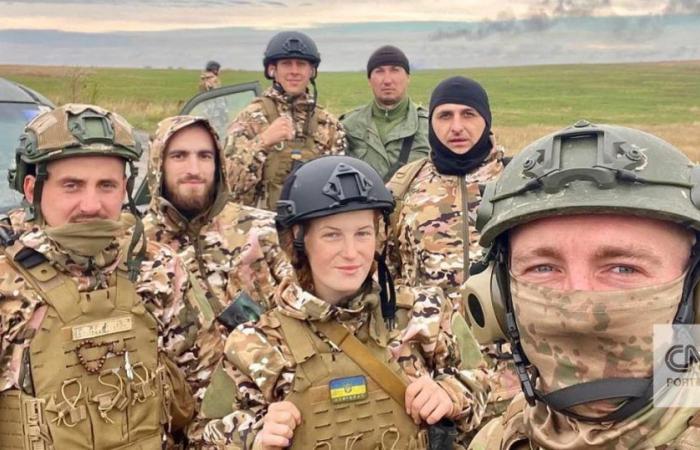
Oksana Rubanyak and Halyna Shevchenko are two Ukrainian women and represent thousands of others who, thanks to the war, now do what they call “men’s jobs”: one carrying a heavy machine gun in the combat zone and the other on the railways from Ukraine
Most of the men in Oksana Rubanyak’s platoon are at least ten years older than her. Before the war, having a young woman commanding an all-male Ukrainian military unit might have given troops pause. But as the platoon prepares for a front-line mission, at a time when Ukraine is desperately trying to contain Russian advances, things like gender and age no longer matter as much, Rubanyak said.
It’s a huge change compared to when he joined the army two years ago.
“Women are recognized, they are promoted to combat positions, to officer positions. It’s no longer just medical or headquarters roles,” Oksana told CNN in a phone interview. Women soldiers are now participating in operations, she said. “And I’m very happy about that.”
The number of women in the military has increased significantly since Russia began its full-scale invasion of Ukraine in February 2022, with more than 62,000 women currently serving in the Ukrainian Armed Forces, according to official statistics. More than 5,000 are serving in combat zones, like Rubanyak, who is now 21 years old.
Rubanyak was 19 years old when she volunteered for the Ukrainian army. She served closely with Bakhmut and was, then as now, the only woman in the platoon. She operated a heavy machine gun and, despite doing everything the men did, she says she felt some prejudice – such as the fact that some men tried to stop her from carrying heavy weapons.
“I heard people say behind my back that I must be someone’s daughter, that my father was going to promote me and so on. It was a new thing for a lot of people. Everyone was trying to discover something about me that simply didn’t exist,” she said. .
And while I say there have been many positive changes in the last two years, there is still work to do. “Everything takes time,” Rubanyak said. “Although all the conditions for women to serve in the army already exist if they want.”
Working two jobs
As increasing numbers of Ukrainians join the war effort, the country’s women are appearing more and more — and not just in the military.
The Ukrainian government does not disclose the number of people who have enlisted in the Armed Forces in the last two years. However, it is clear that hundreds of thousands of people have exchanged day-to-day jobs for military service.
With new military recruitment openings expected soon, employers face a new problem: how to fill the vacancies left by recruited men. At the same time, hundreds of thousands of women fled the country, seeking refuge abroad.
According to the National Bank of Ukraine, employers across the country currently face a shortage of around 60,000 skilled workers, an increase of around 20,000 since 2021.
With so many vacancies to fill, women are often filling the gap. Several Ukrainian organizations and companies are offering training courses to women for some of the jobs conventionally considered male.
Halyna Shevchenko knows this fact firsthand. She works in a repair department of the Ukrainian railways in the Poltava region. Before the war, she managed a team of ten men who repaired complex railway carriage parts. When two of her colleagues were deployed, the company was unable to find anyone to fill their specialized positions.
So Shevchenko started learning technical skills and now does some of the repairs herself. As women make up 40% of Ukrainian railway employees, it is likely that they are not the only one.
“We have some tasks where the male colleagues prepare everything for me, as far as possible, and then I do them because the men need help. Before the war, I had never done this alone, I just supervised the process,” she said. to CNN.
The new tasks – and the war – significantly increased his workload.
Halyna Shevchenko, left, is among the Ukrainian women who distinguished themselves during the war to do what was traditionally seen as “men’s work.” (Source: Department of Information Policy and Public Strategic Communication)
Ukrainian Railways told CNN that 10,200 of its 190,000 employees have been mobilized, with 600 having been killed in the war since the start of the war. At the same time, railways have become Ukraine’s vital arteries as Russian attacks have disrupted air passenger transport and seriously limited shipping across the Black Sea.
Ukraine’s Railways has transported more than 40 million passengers and huge amounts of cargo since the start of the war. The company also introduced all sorts of new military services, including evacuation convoys for injured soldiers.
All this means that Shevchenko’s team has to carry out more repairs.
“I’m a technician, just like my colleagues. That’s why we communicate with the guys on an equal footing. We complement each other and consult on complex repairs,” he said.
War and the economy
Kernel, one of Ukraine’s largest agricultural producers and exporters, has also started looking for solutions to the shortage of workers.
“There is a lack of men and women in the job market. We have reduced the requirements for candidates and introduced basic training programs where a person can learn to become a laboratory assistant or (machine) operator from scratch,” said Natalia Teryakhina, HR director at Kernel, told CNN.
The company also began training women to be boiler operators – a job that women were not used to doing before the war.
“We did a pilot project… to prove that women can work in conventionally male professions. It was a successful experiment and all women continue to work,” he said.
Shevchenko said she is determined to continue doing the “man’s work” of repairing train carriages as long as necessary. She has built a good relationship with her team and says she feels respected by them.
“As long as I have enough health and strength, I will do everything to help my colleagues as much as possible – until the end, until we win,” he said.
Tags: Men lead repair machines front line happy war changed lives Ukrainian women
--


